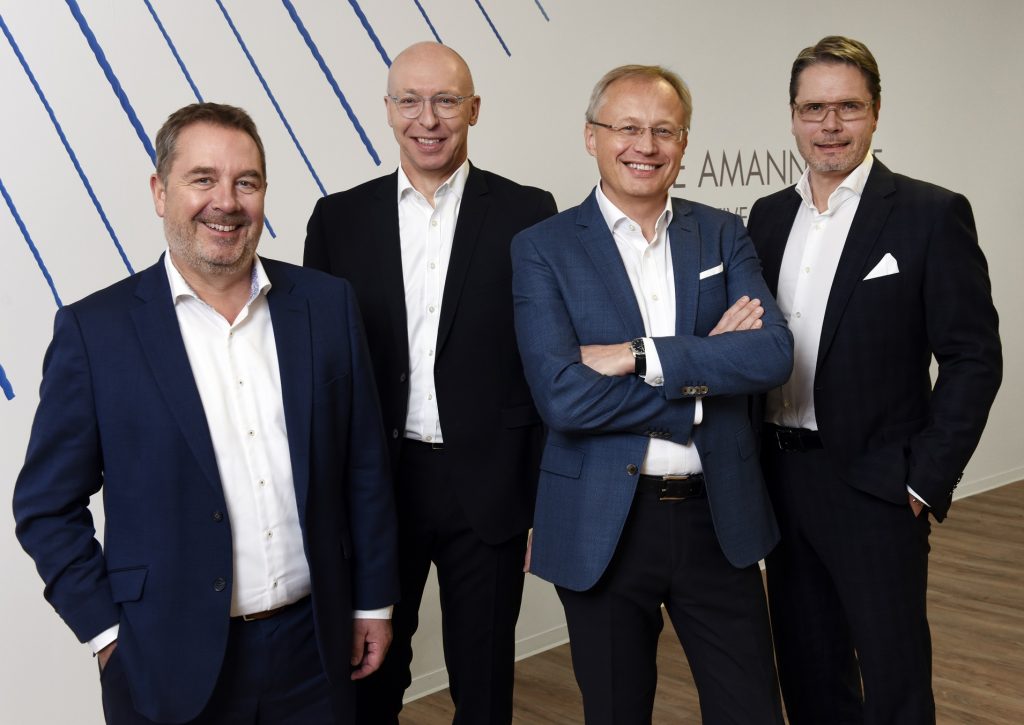After more than 25 years as CEO of the AMANN Group, Bodo Bölzle will be retiring. During this time, Mr Bölzle has transformed the AMANN Group from a European company into a global player and market leader with plants in Germany, UK, Czech Republic, Romania, China, Bangladesh, Vietnam and soon India.
During this time, Mr Bölzle has transformed the AMANN Group from a European company into a global player and market leader with plants in Germany, UK, Czech Republic, Romania, China, Bangladesh, Vietnam and soon India.
Mr Bölzle also volunteered as President of the Südwesttextil e.V. Association and established a milestone in textiles training with the construction of Texoversum at the Reutlingen University of Applied Sciences. In order to provide his expertise and support to the AMANN Group also in future, Bodo Bölzle, following an expressive wish, will join the advisory board after departing at year’s end.

The new management team of the AMANN Group is now complete. In addition to Wolfgang Findeis (CFO) and Peter Morgalla (COO), Ivo Herzog as Chief Sustainability & Innovation Officer (CSIO) and Arved Westerkamp as Chief Sales Officer (CSO) will be shaping the future of this manufacturer of industrial sewing threads, embroidery threads and smart yarns.
New factories
The company is continuing to grow with the construction of a factory in India. By the summer of 2023, all construction and plant installations will be complete, while the first deliveries of industrial sewing threads to customers will commence in the third quarter of 2023. The commissioning of the production facility in Ranipet, India, marks a further milestone in the rapid development the AMANN Group has enjoyed since 2010, with the opening of the then first Asian production plant in Yancheng, China.
This development will not end here. Major investments in additional new locations in Vietnam and Bangladesh are planned for the coming years; the land to be used for this has already been acquired, which means the production space of the AMANN Group will comprise a total of four European and seven Asian factories by 2026. What all locations have in common, regardless of their geographical location, are the high quality standards for production processes and the management system.
Today, the AMANN Group is one of the three globally operating manufacturers of industrial sewing threads. Despite the highly dynamic growth of the Swabian family business founded in 1854, the company has held true to its founding principles maxim to this day by leveraging entrepreneurial foresight and pioneering spirit with level-headedness. This attitude is deeply rooted within the company and has formed the basis for its long-term growth for going on two centuries.
But the successes of the past 168 years of the company’s history don’t mean the company is resting on its laurels. Quite the contrary: the challenges AMANN will face in the future will focus on sustainability, CO2 reduction and climate neutrality. If production starts in Ranipet in the third quarter of 2023, for example, photovoltaics will cover 100% of electricity requirements. This ultra-modern site within the group will be equipped with a zero liquid discharge wastewater treatment plant, which allows the wastewater from the dyeing process to be reused as much as possible. What is left over is a new raw material, a saline sediment that can be reused in the chemical industry.
Environmental protection, fair pay for employees, resource conservation,the company has been very deliberately taking responsibility for its employees, customers, society and the environment around the globe for many years.
With its membership to the United Nations Global Compact in 2019, the company has afforded this position international visibility and is fully committed to the ten universal principles and the vision of a sustainable economy.
Reorganisation of the management team
“After Bodo Bölzle informed us of his wish to enter a well-deserved retirement, we grappled intensively with the tasks of the future management team and the prospective development of the AMANN Group,” says Katja Pielenz, a shareholder and member of the Advisory Board of the AMANN Group. “We see our social responsibility in terms of ensuring the comprehensive sustainability of our economic activities as a central point here.”
With the creation of the Sustainability & Innovation Department, which is managed by Ivo Herzog from the new management team, the company is now resolutely taking its next step on the path to a holistically sustainable direction in its business model as the basis for future economic success. “We are convinced that the only way for us to keep expanding our leading position on the market is with a sustainable set of values and by taking a future-oriented approach,” says Ivo Herzog. “The test of our actions must be whether we contribute to a livable environment for future generations in both ecological and social terms.”
A glimpse into this future is already possible in the product range. The certified Lifecycle product line is now a byword for a 100% circular economy.
But this transformation of the textile industry has only just begun and Arved Westerkamp, responsible for sales as the new Managing Director, explains: “It is now a matter of designing a sustainable business model in which company interests and sustainability criteria go hand in hand, thus making a significant contribution to solving the global challenges facing the textiles industry.”
That the AMANN Group enjoys a good market reputation and is regarded as a key player on the market is a fantastic starting point for successfully transforming into a sustainable and exemplary company in the global textiles industry. “We owe our ability to boldly push forward to the people who have led our company to success in recent years. The new management team featuring Wolfgang Findeis, Ivo Herzog, Peter Morgalla and Arved Westerkamp combines the best possible strengths to both preserve what has been proven and dare to try new things,” explains Katja Pielenz.










